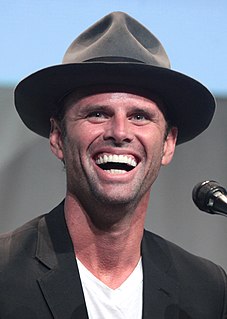A Quote by David Livermore
Many Westerners see follow-through and reliability as the most critical factor in how they calculate the trustworthiness of another individual. In some other cultures, who you know and how you're related to other individuals is the most important variable. And for others, it may be as much about your reputation and what others have said about you.
Related Quotes
It's about something that I'm extremely passionate about: exploring other cultures, how Americans are perceived by other cultures and how we perceive other cultures through our worldview. I travel whenever I get an opportunity to do so, and I think this country is ready for a show on television that is bilingual and really puts front and center another culture, both as the protagonist and the antagonist.
Charisma seems to be more about the intoxicating quality that you have on other people, as opposed to presence, which is more about the self in relation to others, and how you feel you represented yourself in a situation, and how you were able to engage. So it's less about how others see you and more about how you see yourself.
Some of the songs are inspired by personal things that have happened. Others have been inspired by other people's stories, you know, like someone that witnesses something and so I tell the story through my own eyes. And some songs are just about how I feel about the world and others about the places that we have travelled to.
Individuals understood in relational terms cannot be conceived as fully separate from their communities. Others in one's community may already be a part of the self. This conception of the person as overlapping in identity with others has normative implications for what constitutes the good of the individual and how that good relates to the good of others. One's relationship with others can form a part of one's good as an individual, such that one can have a compelling interest in the welfare of these others and in one's relationship with them.
I concluded some time ago that a major part of success of a team, or of an individual, has a great deal to do with the intangible qualities possessed. The real key is in how a person see himself (humility), how he feels about what he does (passion), how he works with others (unity), how he makes others better (servanthood), and how he deals with frustration and success, truly learning from each situations (thankfulness). I believe those concepts are the essence of a good player, team, coach, or individual in any capacity in life.
You realize how much the relationship when kids are young can suffer. And it's important to make sure that you are able to spend some time with each other. As a father, the best thing you can do for the kid is to love the mom. Even as a parent, I believe that loving the mother is the most important thing. And even parents who maybe aren't together I think that's important for them as well to respect each other and to be kind to each other, because I think it does so much in who they would pick to be around, or how they feel about themselves.
From the very beginning, all of my films have divided the critics. Some have thought them wonderful, and others have found very little good to say. But subsequent critical opinion has always resulted in a very remarkable shift to the favorable. In one instance, the same critic who originally rapped the film has several years later put it on an all-time best list. But of course, the lasting and ultimately most important reputation of a film is not based on reviews, but on what, if anything, people say about it over the years, and on how much affection for it they have.
We have to consider culture respectfully, but on the other hand, it's dangerous. When we begin talking about cultures, we begin forgetting about individuals. Every individual is unique. Mankind has common feelings and ideas, but we might have some other connections, too. For example, I might be very close to someone in New York in some way. Because of the music I like or how I like to watch soccer games, or because I like to read Russian classics.
I will do plays as long as they're interested in having me do them. It's the biggest opportunity to learn the most about how to act. Something I discover every time I'm doing one is how little I know about acting - how important the art of listening is, and how important it is to listen with your entire body. You can tell so much of a story with stillness, and a lot of that can be from really actively listening to your scene partner.
What I mean by it, and roughly what most biologists who talk about culture mean by it, is either behavior itself, or information that leads to behavior. Information that is picked up through social learning - so, from being with, watching, being taught by others. It's a way that individuals behave or get information about how they will behave that comes directly from the behavior of others.
The art is about opening, it is not about prejudice, it is not about contempt prior to investigation. It's about endlessly trying to keep from having contempt by admitting that you don't know. Even if you know a lot compared to some other people, usually, I think, the honest experience would be: "God, how little I know! And how much I need to have compassion for myself and for other people."







































